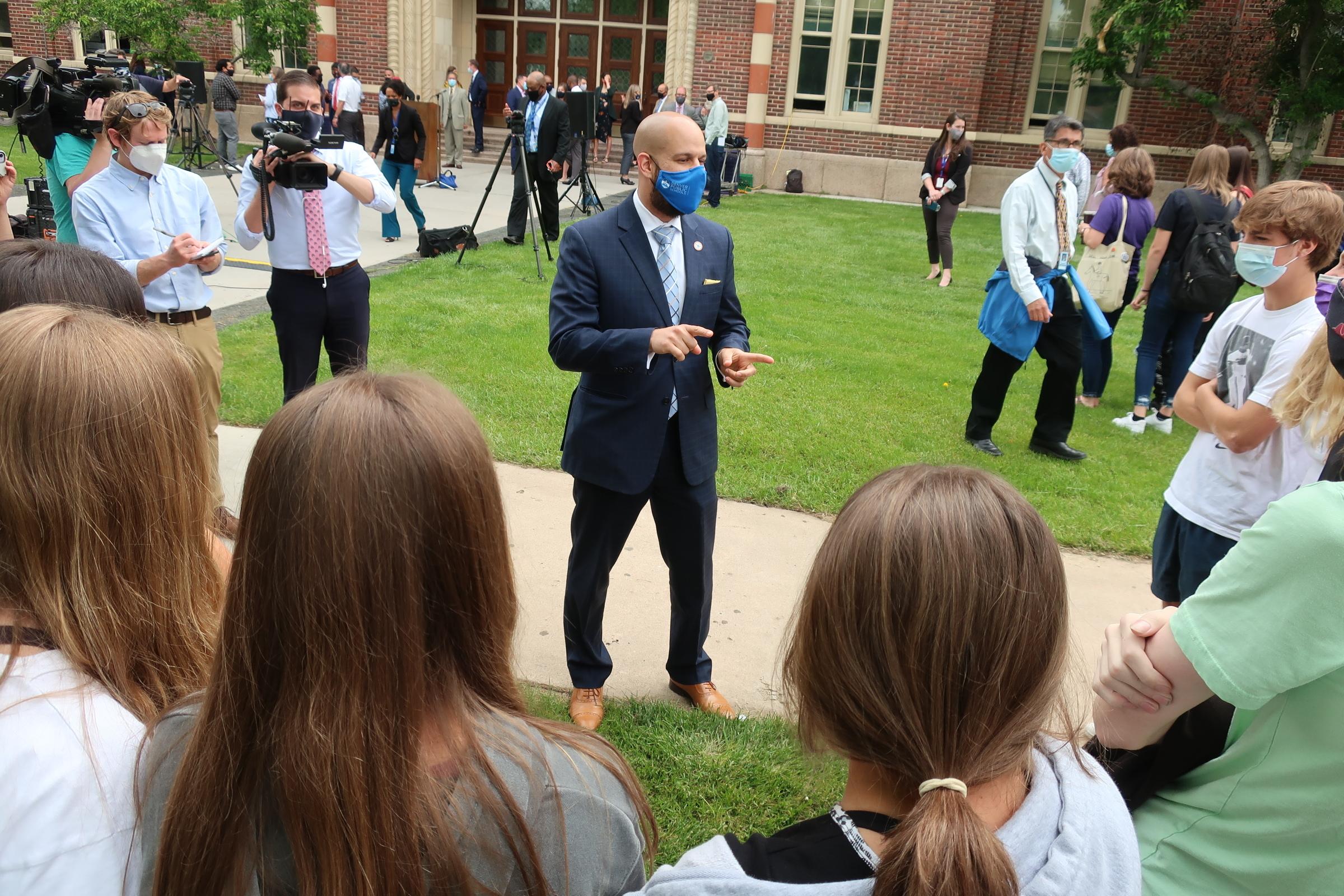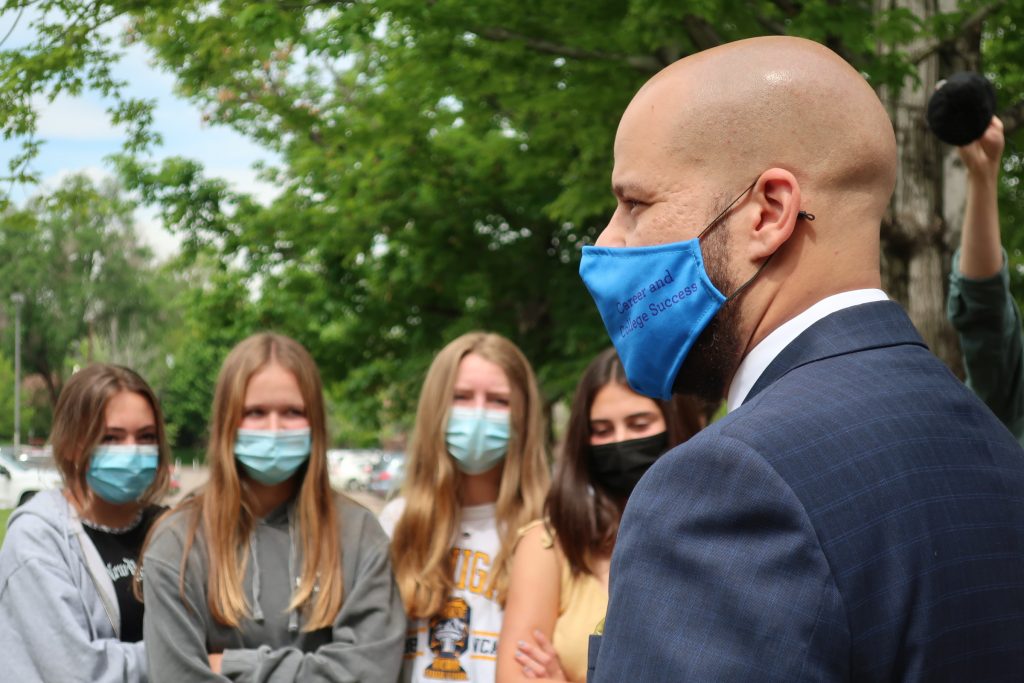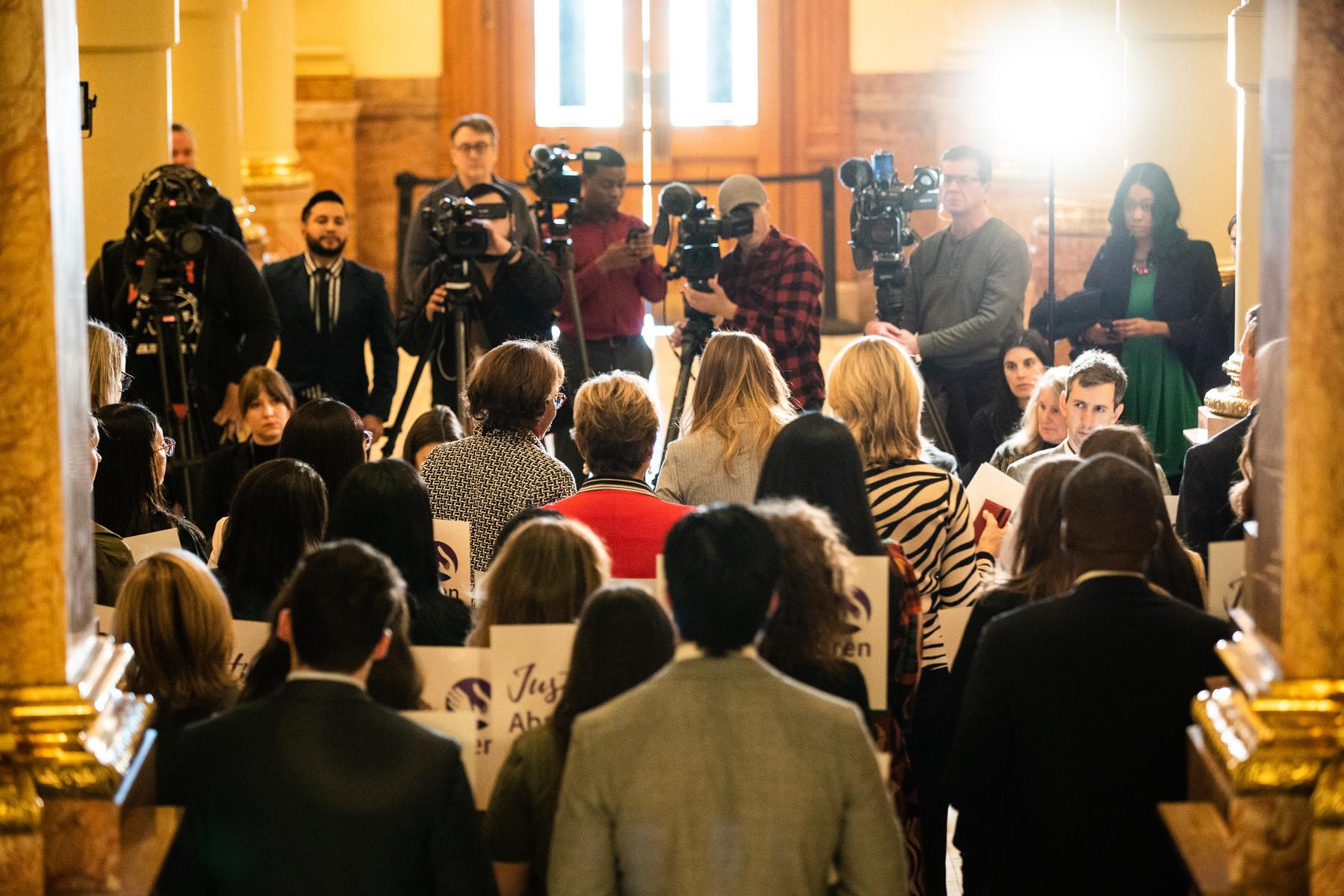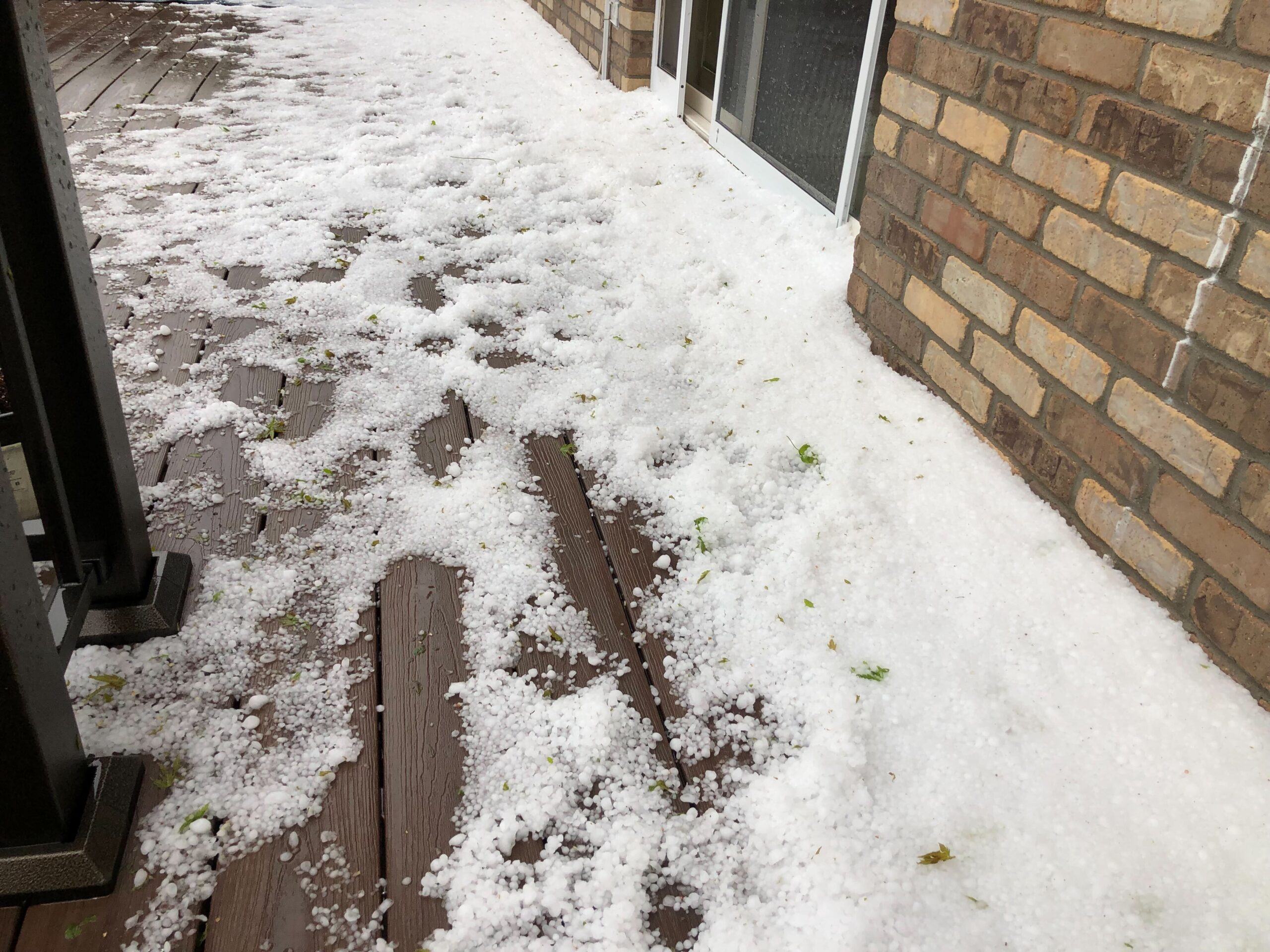
Updated: 12:58 p.m.
The Denver Public Schools Board chose Alex Marrero as its new superintendent Wednesday. Marrero will inherit a number of challenges beyond overseeing a large, diverse urban school district with more than 92,000 students in 207 schools and over 14,000 employees.
“This is a dream come true,” Marrero, 38, told a group of students following a Wednesday press conference outside of South High School. “I hope to retire from here.”
DPS School Board director Carrie Olson said all three candidate finalists – Marrero; Andre Wright, chief academic officer of Aurora Public Schools; and Stephanie Soliven, assistant superintendent for secondary leading and learning in Brevard County, Florida, were strong.
“But Dr. Marrero stood out,” Olson said. “What we like about (him) is his demonstrated record of being engaged with the community, bringing people together, his lived experience as a multilingual learner, and his experience working in New York Public Schools.”
“Our community has called for a unifier and expressed a desire to come together around strong public education for our children,” said board member Jennifer Bacon.
Not only will Marrero have to unify the school district after the departure of former Superintendent Susana Cordova, but will also have to help teachers and administrators figure out how to safely return students to full-time, in-person learning. And, the academic year coming out of a pandemic will shine a spotlight on what schools are doing to accelerate student learning of academic skills they weren’t able to master during remote learning. Schools also may be welcoming students with more intensive mental health challenges stemming from a year of isolation and, for some students, trauma.
"Imagine a world in which a student doesn't have to work it out for themselves," Marrero said at the press conference Wednesday morning. "That's what I'm working toward .... Every student deserves intellectual, emotional and social respect."
The new superintendent will join the DPS board in developing and executing a new strategic plan. The district is also facing budget challenges due to declining enrollment stemming from dropping birth rates and gentrification.
Marrero is currently the Interim Superintendent at City School District of New Rochelle, New York. Officials said at the new conference that the DPS school board will cast a final vote on Marrero’s appointment on June 3.
The state’s largest school district engaged in a massive outreach campaign led by the search firm the Alma Advisory Group to find out what the community wanted in its next superintendent. It gathered more than 7,000 survey responses and hosted 700 community members across 50 meetings. The district received 38 applications for the job, and the board interviewed 15 candidates before narrowing the pool to three.
"We all need to make sure that the next person who leads the district has the support to do so," said DPS board member Angela Cobian, following two in-depth community and student-led interviews earlier this month with the three finalists.
In surveys, racial equity was top of mind for many: Many said they wanted to make sure all schools have access to similar resources to close the academic achievement gap. Many also wanted someone who can build community partnerships, strengthen academics and unify the district. Some community members expressed frustration and concern about what they describe as a politically complicated and divisive environment.
The previous DPS leadership administration made racial equity a centerpiece, passing a resolution on Black excellence that calls for auditing the system to understand how to better serve Black students. It launched an overhaul of curriculum to make it more inclusive of all races and ethnicities and doubled down on racial bias training. In forums, community members said that the rich diversity of student cultures aren’t always honored or integrated enough into the typical school’s curriculum.
The district has struggled for several years to recruit and retain more teachers of color but the urgency around this issue has only grown. Community members will likely continue pressing for racial equity in discipline practices, student access to resources, and student grading and testing.
While Denver has narrowed achievement gaps between white students and students of color, as well as low-income students and more affluent students, the gaps are still considerable.
Who is Alex Marrero?
Marrero is the interim superintendent for the City School District of New Rochelle in New York, just north of the Bronx in New York City. He became the first Latinx head of the city’s school system in September, serving as acting and then interim superintendent. Before that Marrero was the assistant superintendent at the East Ramapo Central School District in New York.
"The root of what I believe in is anchored in the pursuit of growth and learning for all, including myself," Dr. Marrero said in an introductory video when he was a finalist for the DPS job. He said he believes in an open communication style, partnering with many community organizations to assist students, and culturally competent adults who believe in educating the ‘whole child’ which typically means paying attention to social and emotional needs, not just academic needs.
Marrero also speaks Spanish fluently.
At Wednesday’s press briefing, Marrero talked about growing up in poverty and feeling like he didn’t belong in school.
“I felt like I didn’t fit and I was a burden,” he said. “This is a testament that when there is a will, when there’s a commitment from educators, there is a way to make sure you overcome.”

He said undergirding all his actions is this core belief: Every student deserves intellectual, emotional and social respect. He said whatever the dilemma in a school district is, “whether it is those lug nuts on the bus that are loose to the most important part of the contract negotiations and sealing the deal for a [union] unit,” he’s been in those conversations.
Marrero said one of his first actions even prior to becoming superintendent will be to conduct listening tours around the district to understand concerns on a deeper level. Then he’ll shift to re-entry plans for August and “making sure our students are safe and secure.”
Early top priorities will be conducting a data analysis of achievement gaps, understanding the Black Excellence plan more deeply, analyzing and assessing academic and other plans at the school level, and the implications and progress of the district’s consent decree, a federal order requiring the district to address the needs of its English language learners.
Throughout his interview process, Marrero noted that students are often left out of the equation and tapping them for their understanding of “what the gaps are” is crucial, he said.
“The students are the ones who know,” he said. “Before you diversify your course catalog, you need to take a student inventory. Before you address the inequities and disparities, you can do a data analysis, but you also need to engage the students to see if they feel the same, but also they can highlight something that something quantitative does not.”
Following the press briefing, Marrero won over a group of South High students with his easy, relaxed manner. He touched on issues he’d like to discuss the students in the future such as the value of class rankings and how graduations are conducted, and noted his love for the New York Yankees baseball team when a student asked what his favorite activities are.
In two public forums, community members and students responded well to his energy, force, and clarity of language in a field normally laden with jargon.
During the forums, he told the story of almost dropping out of Fordham University, turning to welfare for food stamps, and reaching out for emotional and financial support at the college. He stated he would be in “unwavering” support of students and those who are disenfranchised as the city gentrifies. Marrero was honored as an outstanding administrator by the Latino Caucus of the Council of School Supervisors and Administrators and inducted into the New York Academy of Public Education. He has earned degrees from Fordham University, Manhattan College and Sage Colleges.
DPS has many types of schools. The new superintendent will have to figure out which works best for a diverse student and staff body.
DPS operates a variety of school models including district-run schools, which serve three-quarters of students, but also charter schools, which serve a quarter of students.
Roughly a third of district-run schools are so-called “innovation schools,” where teachers, parents and school leaders come together to create an innovation plan that meets the specific needs of their students and community.
Over the years, the different school models have been simultaneously touted as giving families choice and criticized for causing harmful competition between schools that has damaged the integrity of neighborhoods.
Years of tension over which schools get which students — sometimes charter schools and district-run schools are in the same building — amplified by a color-coded rating system that some said was unfair – left the community divided.
The previous superintendent, Susana Cordova, resigned after two years at the DPS helm. She had previously spent more than 30 years in DPS, first, as a classroom teacher and a principal, and later as the district’s chief academic officer and chief schools’ officer. She was DPS’s first Latina superintendent. Late last year, Cordova announced that she took a job as the deputy superintendent of leading and learning in Dallas.
Finding Cordova’s replacement was a tall task for a district already reeling from the pandemic and learning equity issues.
Two of the candidates were from outside Colorado, and Andre Wright serves in the Aurora Public School District.
Not everybody was happy with the process of how DPS made the choice. A number of Latino organizations, including the Congress of Hispanic Educators and the Latino Education Coalition, urged the school board to reopen the search process for another year. They wanted interim Superintendent Dwight Jones to stay in the post through the end of the 2021-2022 school year.
They and other Latino community leaders are concerned none of the candidates had superintendent experience, or had had experience in a leadership role in a district the size of Denver. They specifically wanted a superintendent who has experience improving educational outcomes for English language learners, which represent approximately one-third of the district.
“We need somebody who understands English language learners. Over 40 percent of our students speak another language,” said former DPS board member Theresa Peña at a press conference last week. Marrero responded Wednesday that he gained intimate working knowledge of what it takes to improves academic skills of English language learners and students who are not literate in their first languages during his roles of assistant principal and principal. He was also an English language learner himself.
DPS’s student body is 55 percent Latino, 13 percent African-American, 2 percent Asian, 0.4 percent Native American, 5 percent multi-ethnic and 24 percent white students.
Sixty-seven percent of students come from families that qualify for free- and reduced-price lunch, and 33 percent identify as English language learners.
DPS has had the top academic growth among large Colorado school districts for each of the past four years. In 2018, DPS graduated approximately 2,100 more students than in 2006; and the number of Black and Latino graduates nearly doubled during that time. Over that same period, drop-out rates declined by 60 percent.









